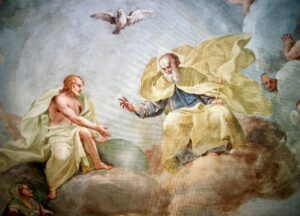 Christians tend to think of truth as something we are commanded to reflect in our speech. The Bible supports that understanding. But John’s gospel goes further and links truth to God’s very nature. It says that Jesus is not only the “Word of God”—He is God. He is also “the way, and the truth, and the life” and He promises the continuing guidance of the Holy Spirit. Here are the relevant passages in that gospel:
Christians tend to think of truth as something we are commanded to reflect in our speech. The Bible supports that understanding. But John’s gospel goes further and links truth to God’s very nature. It says that Jesus is not only the “Word of God”—He is God. He is also “the way, and the truth, and the life” and He promises the continuing guidance of the Holy Spirit. Here are the relevant passages in that gospel:
John 1:1-14: “In the beginning was the Word, and the Word was with God, and the Word was God. He was in the beginning with God . . . And the Word became flesh and lived among us, and we have seen his glory, the glory as of a father’s only son, full of grace and truth.”
John 14:5-17: [Jesus says to Thomas] “I am the way, and the truth, and the life. No one comes to the Father except through me. If you know me, you will know my Father also . . .Whoever has seen me has seen the Father. . . I do not speak on my own; but the Father who dwells in me does his works. Believe me that I am in the Father and the Father is in me . . . I will ask the Father, and he will give you another Advocate, to be with you forever. . . the Holy Spirit . . . [Emphasis added]
In contrast to saying God is truth, Scripture defines Satan as a tempter (“eat the fruit and become like God”), a deceiver, a schemer, a hater of truth, and the “father of lies.” A moment’s reflection on this contrast makes clear that sins against truth are gravely serious. The Catholic Catechism’s list of such sins includes false witness; rash judgment; detraction; and misrepresentation of others’ thoughts, words, or deeds.
But truth is not only important to individuals. It is also vital for entire institutions, systems, and cultures. Truth is foundational to science, philosophy, medicine, economics, engineering, education, history, journalism, government, and law. In every one of these areas, untruths mislead, frustrate investigation and research, corrupt decision-making, block problem solving, and stifle progress.
Tragically, the foundations for all these institutions have been undermined by the false idea that truth is subjective and can be fashioned to each person’s personal preference. This absurd notion has been a common belief in America since the early 1960s, and since then has gained several generations of believers. The result has been this series of effects:
Belief that they create their own truth decreased their interest in other people’s ideas.
Loss of interest in other people’s ideas closed an essential source of learning.
Closure of learning left them ignorant of important knowledge.
Ignorance led to suspicion of unfamiliar ideas and resentment of those who hold them.
Suspicion and resentment created vulnerability to manipulation by promoters of discord.
Such manipulation of their suspicions and resentments fostered intolerance.
Intolerance led to hateful speech and action, including denying others’ right to free speech.
Denying others free speech prevented meaningful discussion and debate.
Without discussion/debate, problems and issues could not be effectively addressed.
Such ineffectiveness increased frustration and created or increased their sense of grievance.
This series of effects fairly describes the process of the cultural decline America has experienced in the last half-century. As noted, that process originated with the belief that people create their own truth, which not only usurps God’s role but effectively denies His very nature. (The outrage of this lie exceeds that of Satan, who only claimed that eating the forbidden fruit would make humans be “like” God. Saying we create truth claims that we take God’s place.)
We should not be surprised that the series of events described here includes suspicion, resentment, intolerance, discord, frustration, and grievance, all of them negative; or that it lacks harmony or love. After all, “God is love, and he who abides in love abides in God, and God in him.” (1 John 4:16) Similarly, the two greatest commandments are “Love the Lord your God with all your heart and with all your soul and with all your mind and with all your strength . . . [and] love your neighbor as yourself.” (Mark 12: 30-31)
Simply said, displacing God, as our prevailing idea of truth does, forfeits love, invites disharmony, and in time forsakes civilization.
Copyright © 2024 by Vincent Ryan Ruggiero. All rights reserved.



